What Dose It Mean to Like Ironic Funny Things
Irony is the contrast between how things seem and how they are. The term comes from the Latin word ironia, meaning "feigned ignorance." Storytellers of all stripes use irony as a literary device to create tension, humor, or as the central conceit in a plot.
To help you make heads or tails of this literary technique, this article will dig into three common types of irony (plus one uncommon one):
- Dramatic irony
- Situational irony
- Verbal irony
- Socratic irony
1. Dramatic irony
A favorite device of William Shakespeare, dramatic irony occurs when the reader knows essential information that the main characters do not. That shot in a horror film when the killer slowly appears in the background, unseen by our hero? A short story set in the idyllic town of Pompeii in 78AD? Both of these are riddled with dramatic irony.
So, why might a writer employ dramatic irony in a story?
To build fear and suspense
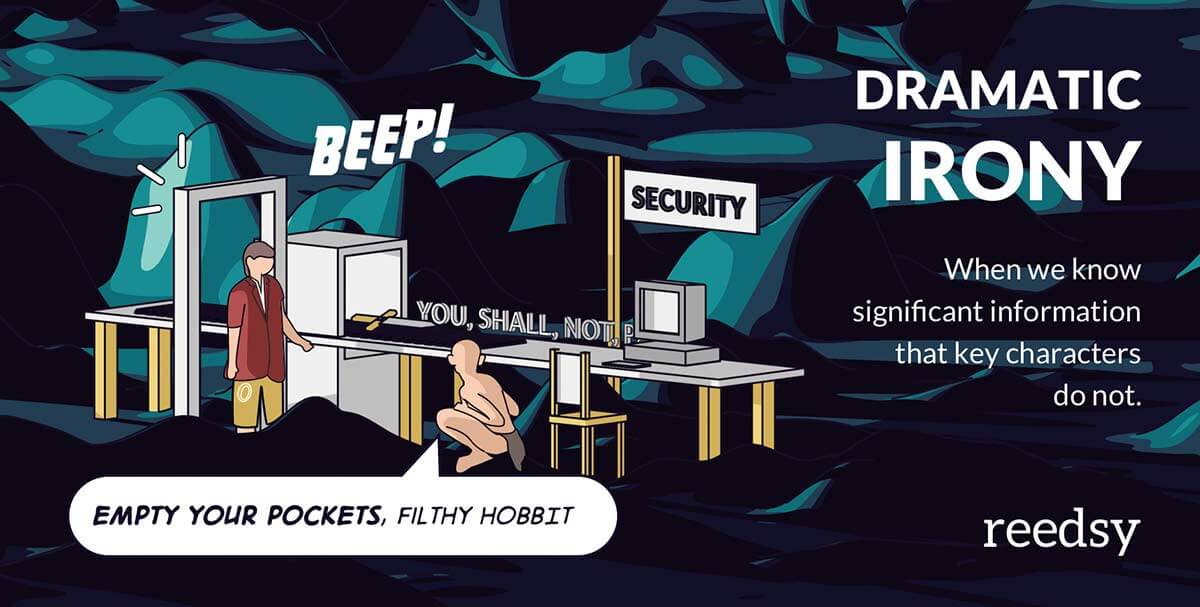
Will the character discover the secret we already know? What will happen when they find out the truth? What if they find out the truth too late? Subconsciously, all of these questions run through our minds as the story unfolds.
Example: The Hobbit contains a perfect example of this when Bilbo happens upon the ring while lost on a mountain. He puts it in his pocket and soon afterward encounters Gollum.
At this point, readers understand the significance of the ring and its importance to Gollum. However, Gollum does not yet realize he has lost the ring, and Bilbo doesn't yet know who the ring belongs to. For this reason, the scene where Bilbo and Gollum engage in a game of riddles becomes even tenser for the audience.
For some truly impressive suspense-building, check out this list of the 50 best suspense books of all time.
To elicit sympathy for a character
If a character is happy, but we know that tragedy lies ahead, a reader cannot help but sympathize with them. If the reader or audience is already "rooting for" the characters, they will hold on to the hope that things will turn out okay for them.
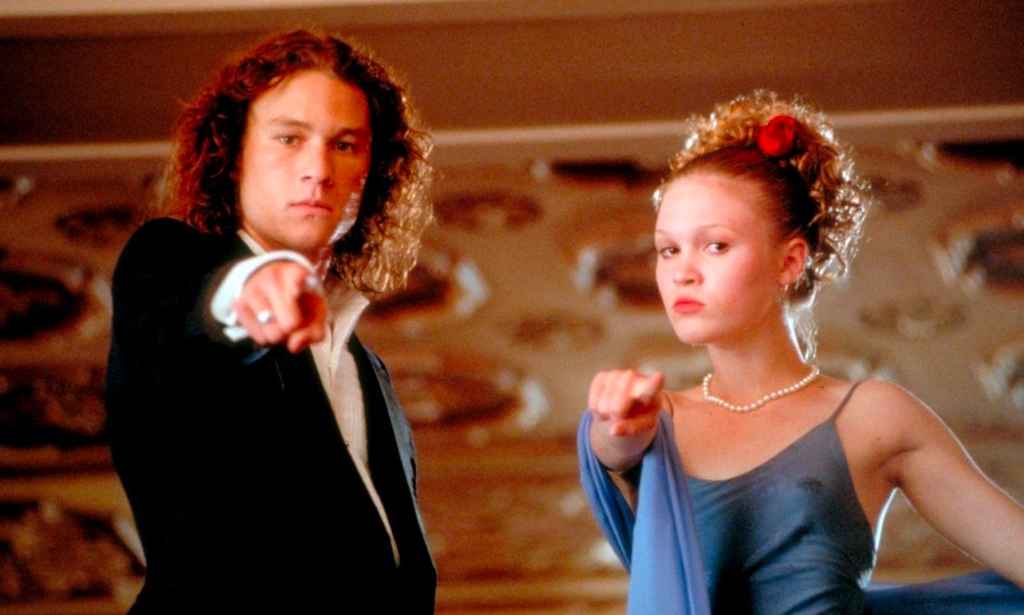
Example: In the modern-day Shakespeare adaptation Ten Things I Hate About You, bad-boy transfer student Patrick is paid by his classmate to woo the cold and aloof Kat. The audience knows that Kat will eventually discover the truth. The deception will wound her, and Patrick will (justifiably) lose her trust. This dramatic irony gives the scenes where they fall in love a bittersweet edge, making us sympathize with both characters.
To create comical situations
A lot of comedy comes out of misunderstandings — where a character believes something that the audience knows not to be true. The dramatic irony turns into comedic tension as the character obliviously digs themselves (or other characters) into a deeper hole.
Example: In a season one episode of Friends, Joey tried to win back his ex-girlfriend Angela by arranging a double date. Joey brings Monica but tells her that Angela's new boyfriend, Bob, is actually her brother — making it seem as though Bob is Monica's date. This misunderstanding turns to hilarious confusion as Monica is creeped out by how 'close' Bob and Angela seem to be.
🖊️
Which famous author do you write like?
Find out which literary luminary is your stylistic soulmate. Takes one minute!
2. Situational irony
When the truth contradicts an expected outcome, it's situational irony — also known as "the irony of events." Situational irony is closely related to the idea of cosmic irony, where the universe seemingly contrives an event for its own amusement. For example, when the "unsinkable" HMS Titanic met an untimely end on its maiden voyage.
To clarify: "the irony of events" is not the same as "coincidence" and "bad luck" (apologies to Alanis Morrisette). If you buy a new car and then accidentally drive it into a tree, that is coincidental and unlucky, but not ironic. However, if a professional stunt driver crashes into a tree on their way home from receiving a "best driver" award, that is situationally ironic.
Within the context of a story, why might a writer use situational irony?
To put a character in an impossible situation
A hero will often work towards a singular goal that they hope will solve all their problems. Instead of simply allowing the hero to win with no strings attached, a writer will often reveal a terrible cost to this 'victory,' forcing the character to choose between what they want and what they need.
Example: Throughout the seventh book of the Harry Potter series, readers follow Harry on his quest to find and destroy Voldemort's six Horcruxes. At the end of the novel, we find out that there is a seventh Horcrux, so to speak — and it's Harry himself.

This unexpected twist also comes with the ironic realization that Harry must sacrifice himself for Voldemort to die. So he willingly goes to meet Voldemort — and his own death. But when Voldemort uses the killing curse on Harry, it has the opposite of his desired effect. Harry lives while the Horcrux dies, bringing Voldemort closer to his greatest fear: mortality.
In this way, Harry being a Horcrux is actually a double case of situational irony. Harry believes he must die to vanquish his enemy, whereas Voldemort thinks he is killing Harry, but he's actually killing himself. Mind = blown, right?
To create a good ol' fashioned twist
You can draw strong reactions from readers by presenting them with carefully executed twists and turns. A plot twist is all the more delicious when it's the polar opposite of what you'd typically expect. Situationally ironic storylines inherently possess an element of surprise, so they're common in the thriller, crime, and mystery genres.
Example: In Roald Dahl's short story "A Lamb to the Slaughter," a betrayed housewife kills her husband with a frozen leg of lamb. When the cops arrive, she cooks the lamb and feeds it to them, effectively making the police dispose of the evidence. Ironic, wouldn't you say?
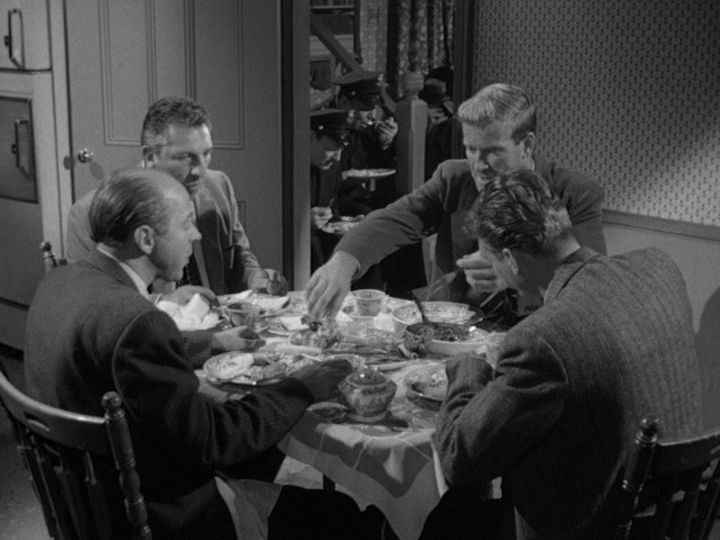
To emphasize the theme or moral of a story
Steering readers to an unexpected destination in a story can emphasize a moral lesson — often reminding readers that an expected outcome is not always guaranteed. For this reason, authors often deploy situational irony in fables or morality tales.
Example: In Aesop's "The Tortoise and the Hare," the unexpected outcome teaches us that slow and steady wins the race. Or, if you ask us, the real moral is that you shouldn't be complacent and take naps during races.
You can also see this type of irony at play in Greek tragedies where the tragic hero is punished for their acts of hubris (excessive pride) — which was apparently the gravest sin in ancient Greece.
Example: In Oedipus Rex, the title character is, unbeknownst to him, a foundling adopted by King Polybus. As an adult, Oedipus seeks out the Oracle at Delphi, who deals a prophecy: he will mate with his mother and kill his father. In an attempt to circumvent this prophecy, Oedipus leaves home, thereby setting himself on the road to killing a man (who he later discovers is his father) and marrying the Queen of Thebes (actually his mother). By defying the will of the gods, he has dealt himself a fate dripping with irony.
3. Verbal irony
Verbal irony is where the intended meaning of a statement is the opposite of what is said. Sarcasm is a form of verbal irony, but it's almost always used to denigrate someone or something. However, verbal irony can also be used by characters who aren't petulant teens from the 90s. There are common phrases that perfectly exemplify verbal irony — many of them similes comparing two entirely unlike things.
- "Clear as mud."
- "Friendly as a rattlesnake."
- "About as much fun as a root canal."
- "Thank you so much" (about something bad).
- "Fat chance!"
Broadly speaking, verbal irony works by either understating or overstating the gravity of the situation. As you might expect, an ironic understatement creates contrast by undermining the impact of something, though the thing itself will be rather substantial or severe.
Example: In The Catcher in the Rye, Holden Caulfield casually says, "I have to have this operation. It isn't very serious. I have this tiny little tumor on the brain." Of course, Holden is lying here, which is why he can be so cavalier; nevertheless, the overall sentiment of this statement remains ironic.
On the other hand, ironic overstatement makes something minor sound like a much bigger deal to emphasize how minor it is.
Example: Say you win $5 in a lottery where the grand prize is $100 million. A friend asks you if you won anything, and you say, "Yeah, total jackpot" — that's an ironic overstatement.
Note: this is not to be confused with hyperbole, in which the overstatement isn't ironic, but stems from wanting to convey just how massive something is — even if it isn't that big. (E.g. "I'm so tired, I could sleep for a million years.")
Now that we know the two faces of verbal irony, that leaves the question: what effect does it have on a piece of writing?
It can highlight a fallacy

Verbal irony is often used for satirical purposes, exaggerating or underplaying their descriptions to reveal a deeper truth. Viewed through a lens of overstatement or understatement, the reader can see how flawed the original concept might be.
Example: Verbal irony can be found in the very first lines of Romeo and Juliet (a play riddled with irony).
Two households, both alike in dignity
In fair Verona, where we lay our scene
From ancient grudge break to new mutiny
Where civil blood makes civil hands unclean.
Though the first line may sound respectful, we can see by the end of this verse that Shakespeare doesn't mean both households are alike in their great dignity. Instead, these lines imply that both households are equally undignified. This irony also serves another purpose: notifying first-time readers that not all that glitters is gold. While both families might technically be considered nobility, their shared inability to act nobly toward one another ultimately leads to a bitter end for our tragic heroes.
It can provide insight into a character
Dialogue is an incredible tool for revealing what a character is like — and how they choose to say something will often speak volumes about who they are. Very often, people who use verbal irony tend to be highly self-aware — or entirely oblivious.
Example: In Casablanca, the corrupt (yet charming) police captain Louis Renault follows instructions from German officials to order a raid on Rick's nightclub under the pretext of closing an illegal gambling den. "I'm shocked — shocked! — to find that gambling is going on in here!" Renault exclaims while thanking Rick's croupier for bringing him his winnings. This knowing overstatement of 'shocked' reveals a lot about his cheerfully cynical worldview.
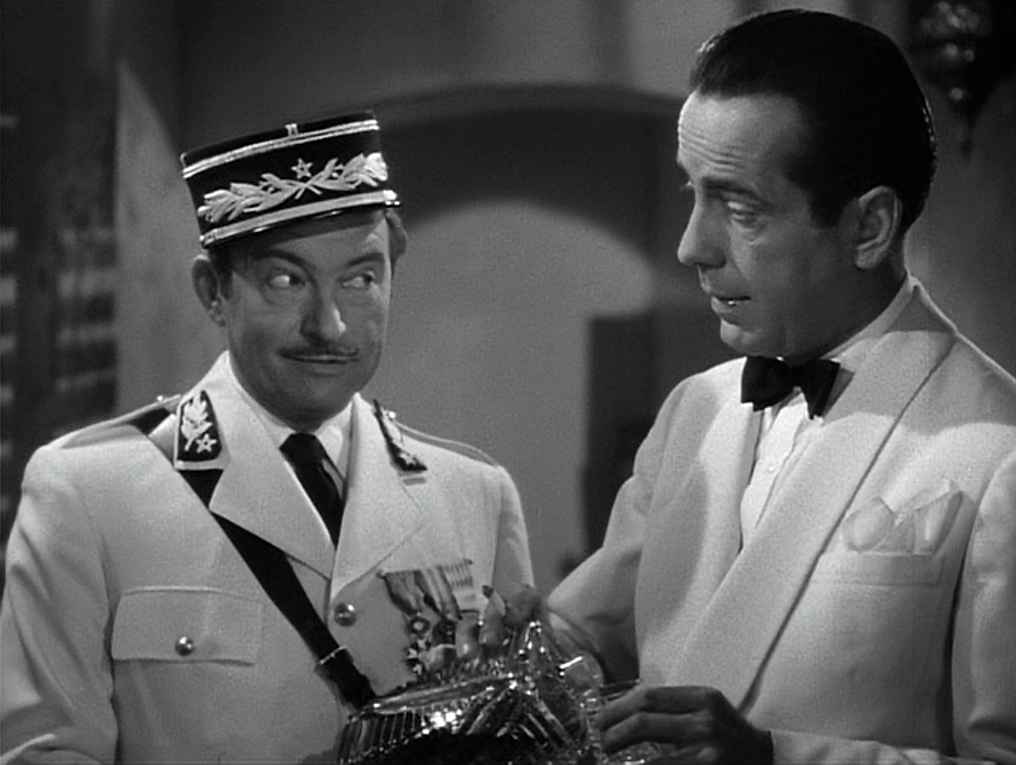
For comic relief
Of course, sometimes writers use verbal irony simply to be funny. Whether it's to highlight a witty character, lighten tension during a dark or difficult scene, or simply make people laugh, verbal irony can provide a much-needed moment of comic relief. As you might expect, verbal irony is a common joke component.
Example: In Annie Hall, Woody Allen's character Alvy Singer speaks directly to the camera and sums up his life philosophy with an old joke. "Two elderly women are at a Catskills mountain resort, and one of 'em says, 'Boy, the food at this place is really terrible.' The other one says, 'Yeah, I know, and such small portions.'
Speaking of philosophies, let's finish off with one last type of irony that has its origins in the ancient world.
4. Socratic irony
This one is a bit of a bonus because it's not technically a literary device — it's more of an "everyday life" type of irony. Socratic irony is named after the great moral philosopher Socrates, who would often feign ignorance to expose another person's faulty assumptions. It can often be used to uncover someone's deceit.
Example: Peter Falk's immortal detective Columbo was a big proponent of Socratic irony to catch criminals out on their lies. He would first ask the suspect questions that would give them the impression that Columbo believed their alibis before slipping in "just one more thing" and dropping a big question that would force the killer to contradict their earlier answers.
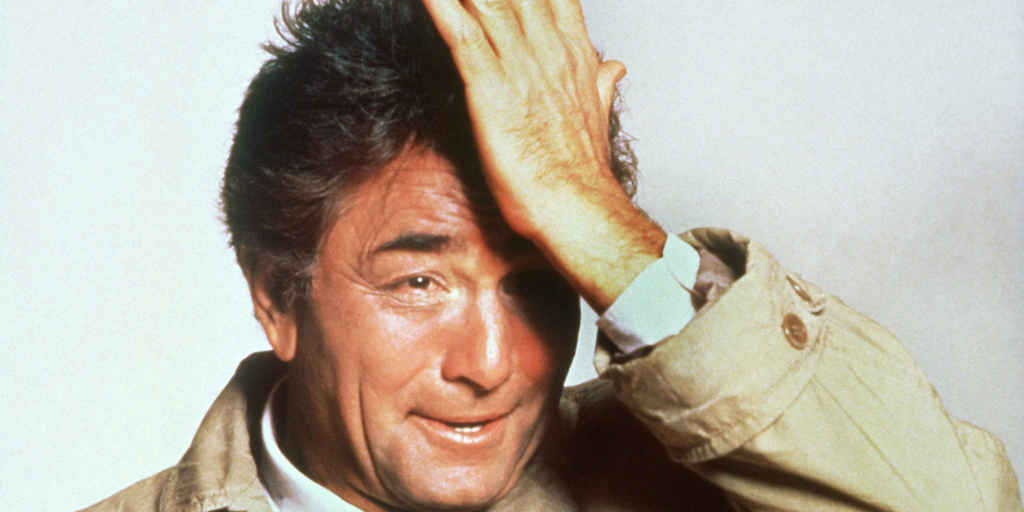
In a similar vein, Socrates gave birth to the Socratic teaching method, where the teacher pretends not to know about a subject to encourage the student to use their power of reasoning to arrive at the correct answer.
Example: A six-year-old student asks the teacher whether he is married. Instead of saying yes or no, the teacher asks the child if there is anything different about how married people look: something they might wear. After some encouragement, the child answers, "a wedding ring!" From there, they can deduce that the teacher is indeed married.
Irony creates a contrast between appearances and underlying truths. When done properly, this can significantly alter a reader's interaction with, expectations of, and insight into a story. But irony must be used with care: it requires people to read between the lines to understand its intentions: a reader who doesn't see the irony will take these words at face value, which would be, as they say, ironic.
Source: https://blog.reedsy.com/what-is-irony/

0 Response to "What Dose It Mean to Like Ironic Funny Things"
Post a Comment